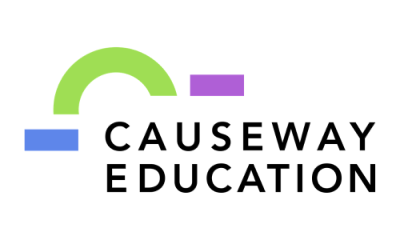Research Briefing: Uni Connect partnerships second call for evidence
/Causeway’s Monitoring, Evaluation & Research Manager Fionna McLauchlan breaks down a recent report of evaluation evidence drawn from the activities of Uni Connect partnerships.
Research is at the heart of our practice at Causeway. We love getting together to discuss a new report or paper (summaries of research papers in Haiku anyone?), and planning how to build an activity, tool or even a programme, from a new piece of evidence. For us, building a strong understanding of the evidence base is key to designing high-quality programmes and activities, and it helps us to feel more confident as practitioners that our work will make a significant impact on the young people we work with.
Once a month we get together as a team to discuss a research paper or evaluation report that’s either connected or related to our approach to programme design and delivery, or that of our friends and partners in the sector.
This month we focused on the report from CFE Research for Office for Students on the findings from the second call for local evaluation evidence from the Uni Connect Partnerships. We’ve been partners and supporters of Uni Connect partnerships since 2017, having worked on a number of programmes and activities, from mentoring to teacher training, so we were keen to get together and reflect on the progress that local partnerships have made so far. Findings in the report are based on 52 submissions of evaluation evidence from Uni Connect Partnerships.
Here is a summary of the key findings we found most interesting and relevant to our work:
Strong evidence that multi-intervention programmes have a positive, sustained impact on outcomes for young people
We were encouraged to learn that multi-intervention approaches that deliver coherent activities over time have a positive impact on young people’s knowledge and awareness of higher education (HE), as well as boosting confidence in decision-making. Learners who engage 7-8 times are more likely to be accepted on an HE programme than those who engaged less frequently or not at all. It was great to see evidence of the longer-term outcomes of interventions. As the Education Policy Institute and TASO’s report last year highlighted, these have not been as frequently focused on in the sector as shorter or intermediate outcomes, such as perceptions or awareness.
Interventions are less effective when delivered as one-off or stand alone activities
The evidence review found that single, stand alone information, advice and guidance (IAG) sessions or workshops appeared to have limited impact compared with those delivered as part of a series (as per point 1). This finding supports our experience from practice – that the best engagement with young people can take place through a coherent programme of events or activities, where sustained engagement can be built over time.
Student ambassadors are crucial to the success of programme delivery.
We welcome the finding that student ambassadors can enhance the impact of outreach interventions through drawing on their own experiences to guide and encourage other young people. But as the report highlights, how something is delivered can shape the effectiveness of the intervention. We want to emphasise the importance of training and support for student ambassadors – they need to be supported with the skills and knowledge to deliver high-quality outreach and reliable information to the young people that they work with. Experience alone does not necessarily equate to high-quality outreach delivery. In one of our blogs from 2019, Helen, our Director of Partnerships, highlights the importance of supporting and training student ambassadors following her work with UNIQ, University of Oxford’s flagship student ambassador programme.
What do these findings mean for Causeway?
We’ll continue to promote and develop sustained activities and engagement
We’re looking forward to having conversations with our partners (and potential new partners!) about developing high-quality event series and coherent programmes of activities for young people. We know that both time and budget can be obstacles to developing series of activities rather than one-off events or workshops. But, bolstered by this new evidence, we hope that we can work together with our friends and partners in the sector to promote the development and delivery of interventions that we know will be more effective.
We want to contribute towards evidence gaps in the effectiveness of online mentoring and outreach
We’re excited to contribute towards the evidence gap on the outcomes of online mentoring and outreach. The effects of the COVID-19 pandemic on the sector have been profound, and like our friends and partners, we have been working hard since the spring of last year to transform our face-to-face activities into online delivery. In a recent blog, Aron, Programme Manager for our student-facing work, shared his experiences of scaling up our e-mentoring programme during the pandemic. We look forward to sharing the results of our evaluations later on this year in our 2020-21 Impact Report – stay tuned!
We’ll keep talking about quality
We’ll continue to focus on quality as a key value behind our programme design and delivery, and we welcome the evidence in this report that will help us to keep quality on the agenda in 2021. Anyone who has attended one of our training sessions or events will know that we have a specific focus and interest in the quality of how something is delivered as well as the content and model of an intervention. We hope to see more evidence on this issue in 2021, and look forward to the conversations that we’re going to have with friends and partners about improving quality across the sector.
Keeping a long-term focus on impact
We know that it is not possible yet to measure the longer-term outcomes of some interventions delivered by Uni Connect partnerships, but we welcome the recommendation in the report for a focus on how immediate impacts can be sustained and turned into longer term impacts. At Causeway, we have been using the UCAS STROBE service for several years to find out the application and acceptance rates of students who took part in our programmes, and we will continue to focus on and investigate the longer-term outcomes and impact of our key programmes.
We would love to hear from friends and partners across the sector about how these findings relate to your work and practice. How would you integrate these findings into your practice and programme plans for the year ahead? What were the most important findings for you and your colleagues? Following the publication of the evaluation results, is there anything about your current plans that you intend to change?






